if引导的非真实条件句
if引导的条件状语从句和虚拟语气的区别

1.if引导的条件状语从句所引导的是原因状语,可以是现实生活中已经出现的真实事件或有可能出现的事情,发生的可能性较大。
而虚拟语气所引导的往往是非真实的,对于过去,现在或将来的虚拟或推断,发生的可能性较小,或已经不可能发生了可以从2个角度去区分:1。
时态A,由if引导的条件状语从句通常都是主句为一般将来时,从句为一般现在时。
B,而在虚拟语气中,时态都是有很多,往往都是根据句子的含义判断,究竟是与现在,过去还是将来的事实相反。
2。
真实与非真实A,由if引导的条件状语从句一般都是真实的,只要所谓的条件成立,一定会成为事实B,但虚拟语气并非如此,if,既然是虚拟,就一定是非真实的,可以根据句意判断其是...条件状语从句连接词主要有 if, unless, as/so long as, on condition that 等。
if 引导的条件句有真实条件句和非真实条件句两种。
unless = if not. 例如:Let's go out for a walk unless you are too tired. 如果不太累,我们去散散步。
If you are not too tied, let's go out for a walk.You will be late ___ you leave immediately.A. unlessB. untilC. ifD. or答案A。
句意:除非你立即走,否则你就回迟到的。
可转化为 If you don't leave immediately, you will be late。
B、D句意不对,or表转折,句子如为 You leave immediately or you will be late.虚拟语气1)虚拟语气用来表示说话人的主观愿望或假想,所说的是一个条件,不一定是事实,或与事实相反。
虚拟语气在条件句中应用比较多。
2)条件句可分为两类,一类为真实条件句,一类为非真实条件句。
10.23.梁if 引导的非真实性条件状语从句

学生姓名梁倩仪年级九授课时课时 5.6教学目标1.口语练习2.同步复习3.中考考点学习重点难点1.口语表达2.语法考点一.日常口语对话二.检查上次作业,讲解重难点三.语法点if 引导的非真实性条件状语从句通过动词形式的变化来表示说话人对发生的动作或存在的状态所持的态度或看法的动词形式称为语气,虚拟语气表示说话人所说的话不是事实,而是一种祝愿,建议或是与事实相反的假设等。
If 引导的条件状语从句分为真实和非真实条件句,非真实条件句应用虚拟语气。
如果要表示与现在或将来事实相反时,其虚拟语气结构为:句型条件从句主句谓语动词形式动词过去式(be动词用were) would+动词原形即:(从句)if +主语+动词过去式(be 动词用were), 一般过去时(主句) 主语+would+动词原形过去将来时如:If I had time, I would go for a walk.如果我有时间,我就会去散步。
(事实上我现在没有时间)If I were you, I would take an umbrella.假如我是你的话,我会带上雨伞。
(事实上我不是你)I would say no if someone asked me to be in a movie. 假如有人请我当电影演员,我会表示拒绝。
(事实上没有人请我当电影演员)1. pretend to do sth.假装做某事I pretended to sleep just now.pretend +从句假装… I pretended that I fell asleep.2. be late for 迟到如:I am late for work/ school/ class/ party.3. a few 与a little 的区别,few 与little 的区别⑴a few 一些修饰可数名词a little 一些修饰不可数名词两者表肯定意义如:He has a few friends. 他有一些朋友。
if引导的条件状语从句和虚拟语气的区别word版本
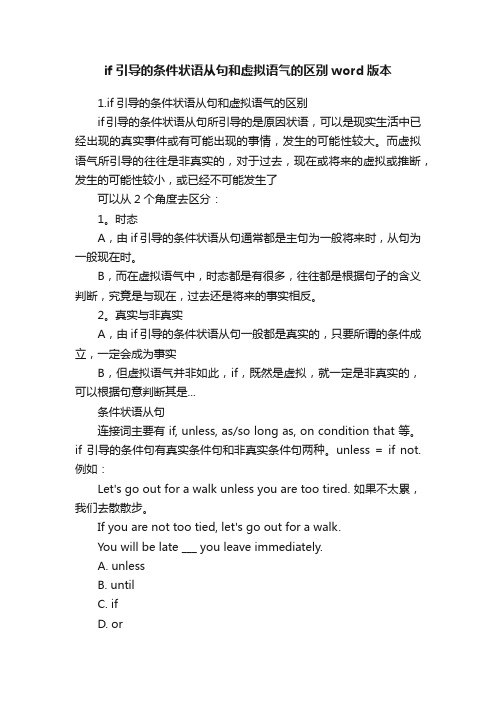
if引导的条件状语从句和虚拟语气的区别word版本1.if引导的条件状语从句和虚拟语气的区别if引导的条件状语从句所引导的是原因状语,可以是现实生活中已经出现的真实事件或有可能出现的事情,发生的可能性较大。
而虚拟语气所引导的往往是非真实的,对于过去,现在或将来的虚拟或推断,发生的可能性较小,或已经不可能发生了可以从2个角度去区分:1。
时态A,由if引导的条件状语从句通常都是主句为一般将来时,从句为一般现在时。
B,而在虚拟语气中,时态都是有很多,往往都是根据句子的含义判断,究竟是与现在,过去还是将来的事实相反。
2。
真实与非真实A,由if引导的条件状语从句一般都是真实的,只要所谓的条件成立,一定会成为事实B,但虚拟语气并非如此,if,既然是虚拟,就一定是非真实的,可以根据句意判断其是...条件状语从句连接词主要有 if, unless, as/so long as, on condition that 等。
if 引导的条件句有真实条件句和非真实条件句两种。
unless = if not. 例如:Let's go out for a walk unless you are too tired. 如果不太累,我们去散散步。
If you are not too tied, let's go out for a walk.You will be late ___ you leave immediately.A. unlessB. untilC. ifD. or答案A。
句意:除非你立即走,否则你就回迟到的。
可转化为If you don't leave immediately, you will be late。
B、D句意不对,or 表转折,句子如为 You leave immediately or you will be late.虚拟语气1)虚拟语气用来表示说话人的主观愿望或假想,所说的是一个条件,不一定是事实,或与事实相反。
if非真实条件句
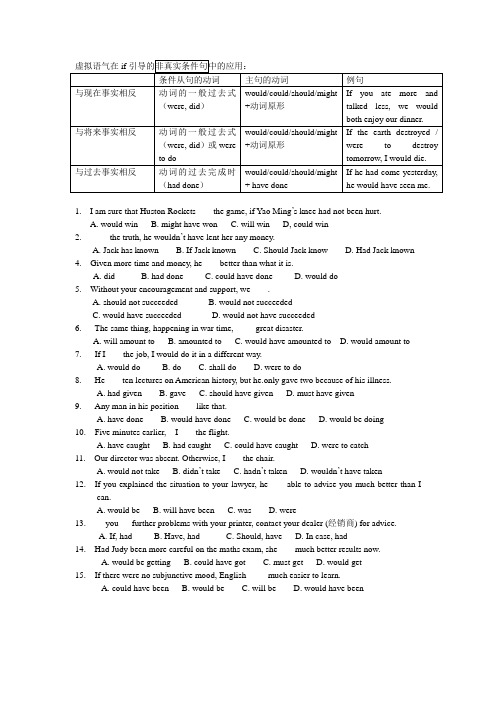
1.I am sure that Huston Rockets ___ the game, if Yao Ming’s knee had not been hurt.A. would winB. might have wonC. will win D, could win2.____ the truth, he wouldn’t have lent her any money.A. Jack has knownB. If Jack knownC. Should Jack knowD. Had Jack known4. Given more time and money, he ___ better than what it is.A. didB. had doneC. could have doneD. would do5. Without your encouragement and support, we ___ .A. should not succeededB. would not succeededC. would have succeededD. would not have succeeded6. The same thing, happening in war time, ____ great disaster.A. will amount toB. amounted toC. would have amounted toD. would amount to7. If I ___ the job, I would do it in a different way.A. would doB. doC. shall doD. were to do8. He ___ ten lectures on American history, but he.only gave two because of his illness.A. had givenB. gaveC. should have givenD. must have given9. Any man in his position ___ like that.A. have doneB. would have doneC. would be doneD. would be doing10. Five minutes earlier, I ___ the flight.A. have caughtB. had caughtC. could have caughtD. were to catch11. Our director was absent. Otherwise, I ___ the chair.A. would not takeB. didn’t takeC. hadn’t takenD. wouldn’t have taken12. If you explained the situation to your lawyer, he ___ able to advise you much better than Ican.A. would beB. will have beenC. wasD. were13. __ you __ further problems with your printer, contact your dealer (经销商) for advice.A. If, hadB. Have, hadC. Should, haveD. In case, had14. Had Judy been more careful on the maths exam, she ___ much better results now.A. would be gettingB. could have gotC. must getD. would get15. If there were no subjunctive mood, English ____ much easier to learn.A. could have beenB. would beC. will beD. would have been。
If引导条件句的用法

If 引导条件句的用法1、真实条件句用于陈述语气,假设的情况可能发生,其中if 是如果的意思;时态关系句型:条件从句主句一般现在时shall/will + 动词原形If he comes, he will bring his violin.典型例题The volleyball match will be put off if it ___.A. will rainB. rainsC. rainedD. is rained答案B;真实条件句主句为将来时,从句用一般现在时;注意:1 在真实条件句中,主句不能用be going to表示将来,该用shall, will.错If you leave now, you are never going to regret it.对If you leave now, you will never regret it.2 表示真理时,主句谓语动词便不用shall will +动词原形,而直接用一般现在时的动词形式;2 非真实条件句1时态:可以表示过去,现在和将来的情况;它的基本特点是时态退后;a. 同现在事实相反的假设;句型:条件从句主句一般过去时should would +动词原形If they were here, they would help you.b. 表示于过去事实相反的假设;句型:条件从句主句过去完成时shouldwould have+ 过去分词If she had worked harder, she would have succeeded.The rice would not have been burnt if you had been more careful.If my lawyer had been here last Saturday, he would have prevented me from going.If he had come yesterday, I should / would have told him about it.含义:He did not come yesterday, so I did not tell him about it.If he had not been ill and missed many classes, he would have made greater progress.含义:He was ill and missed many lessons, so he did not make greater progress.c. 表示对将来的假想句型:条件从句主句一般过去时should+ 动词原形were+ 不定式would + 动词原形should+ 动词原形If you succeeded, everything would be all right.If you should succeed, everything would be all right.If you were to succeed, everything would be all right.3 混合条件句主句与从句的动作发生在不同的时间,这时主,从句谓语动词的虚拟语气形式因时间不同而不同,这叫做混合条件句;If you had asked him yesterday, you would know what to do now.从句与过去事实相反,主句与现在事实相反;If it had rained last night 过去, it would be very cold today 现在.4 虚拟条件句的倒装虚拟条件句的从句部分如果含有were, should, 或had, 可将if省略,再把were, should或had 移到从句句首,实行倒装;Were they here now, they could help us.=If they were here now, they could help us.Had you come earlier, you would have met him=If you had come earlier, you would have met him.Should it rain, the crops would be saved.=Were it to rain, the crops would be saved.注意:在虚拟语气的从句中,动词’be’的过去时态一律用"were",不用was,即在从句中be用were代替;If I were you, I would go to look for him.如果我是你,就会去找他;If he were here, everything would be all right.如果他在这儿,一切都会好的;典型例题_____ to do the work, I should do it some other day.A. If were IB. I wereC. Were ID. Was I答案C. 在虚拟条件状语中如果有were, should, had这三个词,通常将if省略,主语提前, 变成were, should, had +主语的形式;但要注意,在虚拟条件状语从句中,省略连词的倒装形式的句首不能用动词的缩略形式;如我们可说Were I not to do., 而不能说Weren’t I to do.5 特殊的虚拟语气词:should1 It is demanded / necessary / a pity + that…结构中的主语从句的谓语动词要用should 加动词原形, should 可省略;句型:1suggestedIt is 2important that…+ should do3 a pity1suggested, ordered, proposed, required, demanded, requested, insisted;+ should do2important, necessary, natural, strangea pity, a shame, no wonder3It is suggested that we should hold a meeting next week.It is necessary that he should come to our meeting tomorrow.2在宾语从句中的应用在表示命令、建议、要求等一类动词后面的从句中;order, suggest, propose, require, demand, request, insist, command, insist + should doI suggest that we should hold a meeting next week.He insisted that he should be sent there.注意:如suggest, insist不表示"建议" 或"坚持要某人做某事时",即它们用于其本意"暗示、表明"、"坚持认为"时,宾语从句用陈述语气;The guard at gate insisted that everybody obey the rules.判断改错:错You pale face suggests that you should be ill.对Your pale face suggests that you are ill.错I insisted that you should be wrong.对I insisted that you were wrong.3在表语从句,同位语从句中的应用在suggestion, proposal, idea, plan, order, advice等名词后面的表语从句、同位语从句中要用虚拟语气,即should+动词原形;My idea is that we should get more people to attend the conference.I make a proposal that we should hold a meeting next week.。
英语—虚拟语气
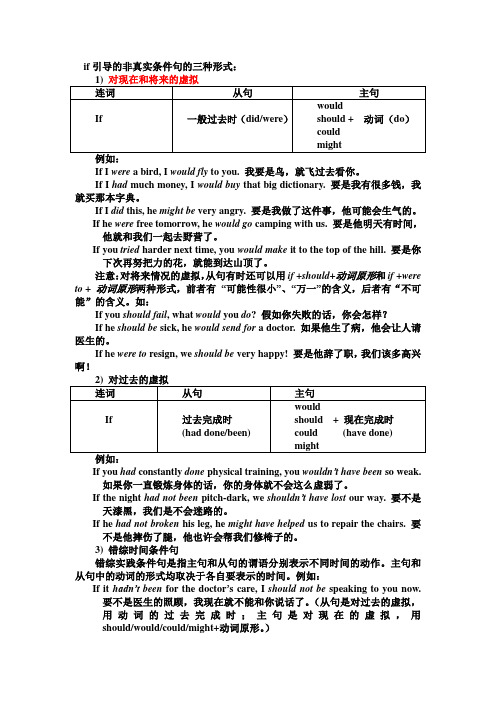
if 引导的非真实条件句的三种形式:If I were a bird, I would fly to you. 我要是鸟,就飞过去看你。
If I had much money, I would buy that big dictionary. 要是我有很多钱,我就买那本字典。
If I did this, he might be very angry. 要是我做了这件事,他可能会生气的。
If he were free tomorrow, he would go camping with us. 要是他明天有时间,他就和我们一起去野营了。
If you tried harder next time, you would make it to the top of the hill. 要是你下次再努把力的花,就能到达山顶了。
注意:对将来情况的虚拟,从句有时还可以用if +should+动词原形和if +were to + 动词原形两种形式,前者有 “可能性很小”、“万一”的含义,后者有“不可能”的含义。
如:If you should fail , what would you do ? 假如你失败的话,你会怎样?If he should be sick, he would send for a doctor. 如果他生了病,他会让人请医生的。
If he were to resign, we should bevery happy! 要是他辞了职,我们该多高兴啊!If you had constantly done physical training, you wouldn ’t have been so weak. 如果你一直锻炼身体的话,你的身体就不会这么虚弱了。
If the night had not been pitch-dark, we shouldn ’t have lost our way. 要不是天漆黑,我们是不会迷路的。
if引导的条件句是什么从句

if引导的条件句是什么从句if 引导的条件句有真实条件句和非真实条件句两种;1、真实条件句:叙述真实可能发生的事情;例句:If you fail in the exam,you will let him down.如果你考试不及格,你会让他失望的。
扩展资料2、非真实条件句:虚拟语气的一种,表示与实际已发生事实相反:例句:If I were you, I would invite him.如果我是你,我会邀请他。
3、另一个常用连词为unless,大多数时候意思与 if not 相近:例句:Let's go out for a walk unless you are too tired.我们出去散步吧,除非你太累了。
例句:If you are not too tired, let's go out for a walk.如果你不太累,我们出去散步吧。
条件状语从句的基本用法1、用if引导:if意为“如果”。
例句:If you cheat in the exam you’ll never get away with it.考试作弊必予追究。
2、用unless引导:unless的意思是“如果不”“除非”。
例句:Unless you go at once you will be late.如果你不马上走,就会迟到的'。
3、用as [so] long as引导:as [so] long as的意思是“如果”“只要”。
例句:I’ll remember that day as long as I live.只要我活着,我就不会忘记那个日子。
4、用in case引导:in case用连词引导条件状语从句时,其意为“如果”“万一”。
例句:In case I forget, please remind me about it.万一我忘记,请提醒我一下。
5、条件状语从句的时态:当主句为将来时态或含有将来意义时,条件状语从句习惯上要用一般现在时表示将来意义,而不能直接使用将来时态。
虚拟语气讲解
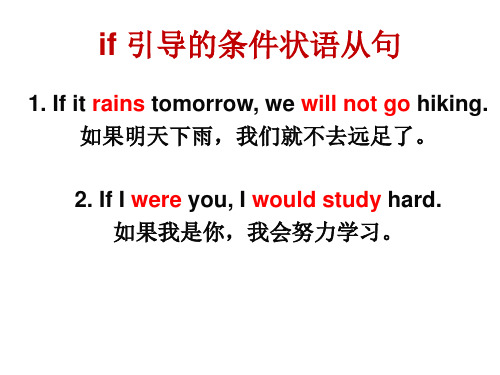
If I had a million dollars now, I would…
如果我有一百万美元,我会为我的家人买一座别墅。 If I had a million dollars now, I would buy a villa(别墅) for my family. 如果我有一百万美元,我会环游世界。 If I had a million dollars now, I would travel around the world. 如果我有一百万美元,我会去购物。 If I had a million dollars now, I would go shopping. 如果我有一百万美元,我会把它捐给慈善机构。 If I had a million dollars now, I would donate it to a charity organizaall match We would have won the match 如果杰克踢进那个球(score that goal), 如果我们还有多几分钟,
如果我们更加刻苦地训练,
如果本(Ben)把球传给了乔(Joe), 如果有成千的球迷为我们尖叫(scream for us), 如果我死死的盯住球(take one’s eyes off sth), 如果我前个晚上不熬夜(stay up late), 如果我们没有掉以轻心(take it easy), 如果我们没有精疲力竭(run out of), 我们本来是会得冠
虚拟(非真实)条件句 主句
与现在 事实相 反的假 设 与过去 相反的 假设
If+主语+动词的过去式 (动词be用were)
主语+should/
If+主语+had +过去分词
if条件状语从句的用法_If引导的条件状语从句

if条件状语从句的用法_If引导的条件状语从句很多英语学习者都觉得If引导的条件状语从句这个句型很难,学习起来很吃力。
下面是小编为你整理的If引导的条件状语从句的相关资料,希望大家喜欢!If引导的条件状语从句用法1.if引导的条件状语从句可以放在主句之前,也可以放在主句之后,如果放在主句之前,中间要用逗号将主句和从句隔开。
例如:If I am free, I will come to see you.= I will come to see you if I am free.如果我有空,我就来看你。
2. 在含if引导的条件状语从句的复合句中,主句用一般将来时,从句通常用一般现在时态表示将来意义,即主将从现原则。
例如:If it snows tomorrow, we will go skiing.如果明天下雪,我们就去滑雪。
3. 在含if引导的条件状语从句的复合句中,语句的谓语还可含有情态动词can、must、may等,主句也可是祈使句。
例如:If it stops raining, we can go out.如果雨停了,我们就能出去。
4. 在含if引导的条件状语从句的复合句中,如果主句部分描述的是客观事实或真理,要用一般现在时。
例如:If you heat the ice, it turns into water.如果你加热冰,它就会变成水。
if引导的非真实条件句对过去的虚拟条件从句(if):主语+had done 主句might/would/should/could+have done 对现在的虚拟if+ 主语+动词过去式(be用were)主句might/would/should/could+do对将来的虚拟if+主语+动词过去式(be用were)或主语+should do或主语+were to do主句might/would/should/could+doe.g.Tom got to the station in time because he started earlier.If Tom had started late, he would have missed the train.Do you think the thief entered through the door?No, if he had, I don't believe, he would have broken the living room window.If the book weren't so expensive, I would buy it.If you didn't live so far away, we would be able to visit you more.What would you do if you lost your passport in a foreign country?Why hasn't he come? If he should not come on time, we would have to put off the trip.2.注意事项e.g.If she hadn't work hard at English in the past, she wouldn't work as well as a secretary in a large company now. 混合时间的虚拟语气从句为对过去的虚拟,主句是现在。
if引导地非真实性条件状语从句即虚拟语气

if 引导的非真实性条件状语从句即虚拟语气通过动词形式的变化来表示说话人对发生的动作或存在的状态所持的态度或看法的动词形式称为语气。
.英语中的语气分三种:陈述语气、祈使语气、虚拟语气。
虚拟语气表示说话人所说的话不是事实,而是一种祝愿,建议,与事实相反的假设或实际可能性不大的情况等(即非真实的假设)。
If 引导的条件状语从句分为真实和非真实条件句(虚拟条件句)。
真实条件句表示在假设的条件下,有可能实现的情况。
非真实条件句表示的是假设的或实际可能性不大的情况,故采用虚拟语气。
If he doesn’t hurry up, he will miss the bus.( 真实条件状语)If he was free, he asked me to tell stories.(真实条件状语)If I were you, I would go at once.(非真实条件状语从句)If there was no air, people would die.(非真实条件状语从句)1)非真实条件句中虚拟语气的基本形式。
假设类型条件从句的动词结果主句的动词与现在事实相反动词过去式(be只用were)would/should/could/might + 动词原形与过去事实相反 had+过去分词 would/should/could/might +have + 过去分词与将来事实相反动词过去式/(should/were to)+动词原形would/should/could/might + 动词原形①与现在事实相反If I had time, I would go for a walk.如果我有时间,我就会去散步。
(实际情况:我现在没有时间,也不会去散步。
)If I were you, I would take an umbrella.假如我是你的话,我会带上雨伞。
(事实上我不可能是你。
)I would say no if someone asked me to be in a movie.假如有人请我当电影演员,我会表示拒绝。
虚拟语气用法小结
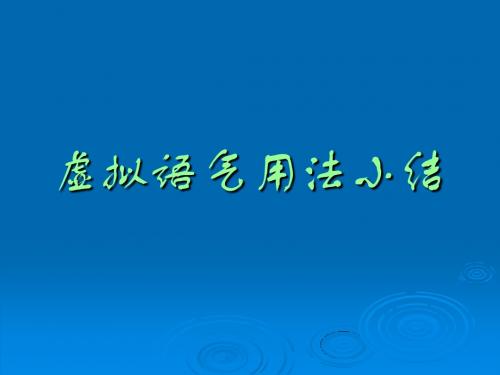
例如:
It is necessary that he be sent to prison at once. It is best that workers have a pleasant place to relax.
3、用于表语从句或同位语从句中。 请注意下列名词:
suggestion, idea, plan, proposal, recommendation, advice, decision, instruction, insistence, preference, necessity, requirement, resolution, motion, desire… 以上名词后出现的表语从句或同位语从句 中,谓语动词采用(should)+ 中,谓语动词采用(should)+ 动词原形构成 虚拟语气。
1、例如:
I suggest that he (should) go at once. In the past man generally preferred that their wives work at home.
2、用于主语从句中
It is desired (suggested, requested, ordered, decided, arranged, recommended…) that… It is strange (necessary, incredible, urgent, possible, essential, advisable, natural, important, preferable, ridiculous, vital, insistent, best, better…) that… It is a pity (shame, must…) that… 上述结构引起的主语从句中谓语动词采用 (should)+ 动词原形构成虚拟语气。
if引导的条件句 与 虚拟语气 的 区别

if引导的条件句与虚拟语气的区别if引导的从句什么时候用虚拟语气最佳答案if引导的条件状语从句的分类及虚拟条件句的判断1、可以把条件句分为两类:1).真实条件句(Sentences of Real Condition):凡是假设的情况发生性可能很大,就是真实条件句。
例如:⑴、If I have time , I will help you with this work.如果我有时间会帮助你做此工作的。
⑵、As long as I say anything wrong, you must point it out.只要我说了什么错话,你一定要指出来。
⑶、If time permits, we'll go fishing together.(如果有时间的话,我们就一起去钓鱼。
)2).虚拟条件句(Sentences of Unreal Condition):当假设是不大可能实现时,就是虚拟条件句。
例如:⑴、If I were you , I would have attended the meeting. 如果我是你的话,就去参加会议了。
⑵、If he had come here yesterday, he would have seen his old friend.假如他昨天来这儿的话,就会看见他的老朋友。
⑴、If it had rained yesterday, we would have stayed at home.(如果昨天下雨的话,我们就会留在家里。
)2、.if条件状语从句中虚拟语气的判断判断是真实条件句还是非真实条件句。
只有在非真实条件句中才使用虚拟语气。
通过句子意思,看假设的条件是否能够实现,能够实现是真实条件句,不能使用虚拟语气;假设的条件不能实现则是非真实条件句,要用虚拟语气。
判断这个假设是与哪个事实相反。
通常有三种情况:①与过去事实相反。
②与现在事实相反。
③与将来事实可能相反。
if引导的条件状语从句的用法

(3)假设
真的,或者有可能成为真的;
(二)假设将来,假设的条
将来
件是将来可能实现的。
1. if 非真实条件句(虚拟)——假设现在
(二)遵循的原则
should do
might+do
例 7 If I _____(be) a bird,I would fly to you right
状态,是正在玩球的意思,
所以此空填 is playing。
3. if 引导的真实条件状语从句——假设将来
例 3 If it _____(rain) tomorrow,we will stay at home.
解析:如果你不想受伤,
就不要玩刀。根据 Don’
t
play with the knife,主句是祈使句,所以从句为 if 引导
to the park.
he will take me to the park,主句用的一般将来时,而且
可以分析出,他哥哥现在还没有回,所以从句为 if 引
导的表将来的条件状语从句。根据“主将从现”的原
则,此空填 comes。
2. if 非真实条件句(虚拟)——假设过去
例8
Years ago if someone_____ (turn) round to
批改学生作文时,遇到拼写错误较多的学生可以这样
及各个时代相关代表作品的赏析,感受中西方文化的
评价:
不同,提高其审美水平;在进行人教版(2014)高中英
neat and tidy!
学生参观学校的科学实验室或者本地的科技馆,感受
1. 认 同 欣 赏:I like your handwriting,which is so
if 非真实条件句中的虚拟语气
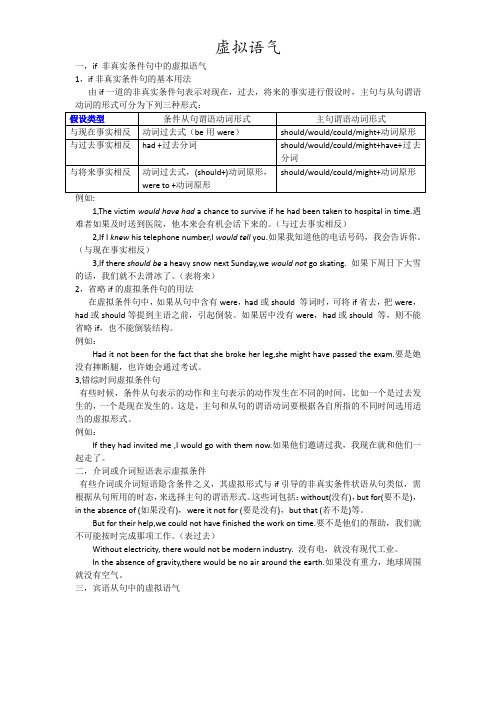
一,if 非真实条件句中的虚拟语气1,if非真实条件句的基本用法由if一道的非真实条件句表示对现在,过去,将来的事实进行假设时,主句与从句谓语动词的形式可分为下列三种形式:1,The victim would have had a chance to survive if he had been taken to hospital in time.遇难者如果及时送到医院,他本来会有机会活下来的。
(与过去事实相反)2,If I knew his telephone number,I would tell you.如果我知道他的电话号码,我会告诉你。
(与现在事实相反)3,If there should be a heavy snow next Sunday,we would not go skating. 如果下周日下大雪的话,我们就不去滑冰了。
(表将来)2,省略if的虚拟条件句的用法在虚拟条件句中,如果从句中含有were,had或should 等词时,可将if省去,把were,had或should等提到主语之前,引起倒装。
如果居中没有were,had或should 等,则不能省略if,也不能倒装结构。
例如:Had it not been for the fact that she broke her leg,she might have passed the exam.要是她没有摔断腿,也许她会通过考试。
3,错综时间虚拟条件句有些时候,条件从句表示的动作和主句表示的动作发生在不同的时间,比如一个是过去发生的,一个是现在发生的。
这是,主句和从句的谓语动词要根据各自所指的不同时间选用适当的虚拟形式。
例如:If they had invited me ,I would go with them now.如果他们邀请过我,我现在就和他们一起走了。
二,介词或介词短语表示虚拟条件有些介词或介词短语隐含条件之义,其虚拟形式与if引导的非真实条件状语从句类似,需根据从句所用的时态,来选择主句的谓语形式。
if引导的非真实条件句的三种类型

"if引导的非真实条件句" 是指在现实情况中,条件句中的情况并不一定能够实现,或者实现的可能性很小。
这种句子通常用来表达与事实相反的情况,或者在虚拟环境中进行假设。
以下是 if 引导的非真实条件句的三种类型:1. 与现在事实相反或不可能发生的情况:这种类型的句子使用了一般现在时和一般过去时,但实际上这两种时态并不矛盾,因为它们只是表达了假设的情况。
例如:If I had enough money, I would buy a car. (如果我有很多钱,我会买车。
)If he were here, he would help us. (如果他在这里,他会帮助我们。
)2. 与过去事实相反或不可能发生的情况:这种类型的句子使用了过去完成时和过去进行时。
例如:If he had known your phone number, he would have called you. (如果他知道你的电话号码,他会打电话给你。
)If they had been here, they would have seen the movie. (如果他们在这里,他们会看到电影。
)3. 与将来事实相反或不可能发生的情况:这种类型的句子使用了过去将来时和过去将来进行时。
例如:If it were to rain tomorrow, we would stay at home. (如果明天下雨,我们会待在家里。
)If they were to come with us, we would plan to go out. (如果他们和我们一起去,我们会计划出去玩。
)。
if引导的非真实条件句
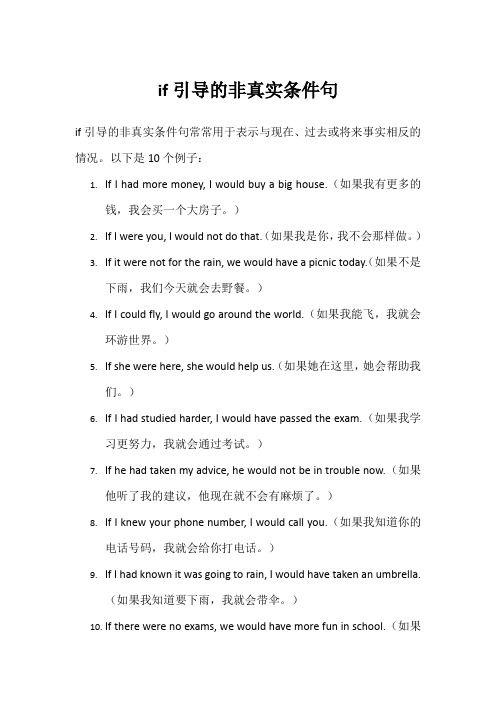
if引导的非真实条件句if引导的非真实条件句常常用于表示与现在、过去或将来事实相反的情况。
以下是10个例子:1.If I had more money, I would buy a big house.(如果我有更多的钱,我会买一个大房子。
)2.If I were you, I would not do that.(如果我是你,我不会那样做。
)3.If it were not for the rain, we would have a picnic today.(如果不是下雨,我们今天就会去野餐。
)4.If I could fly, I would go around the world.(如果我能飞,我就会环游世界。
)5.If she were here, she would help us.(如果她在这里,她会帮助我们。
)6.If I had studied harder, I would have passed the exam.(如果我学习更努力,我就会通过考试。
)7.If he had taken my advice, he would not be in trouble now.(如果他听了我的建议,他现在就不会有麻烦了。
)8.If I knew your phone number, I would call you.(如果我知道你的电话号码,我就会给你打电话。
)9.If I had known it was going to rain, I would have taken an umbrella.(如果我知道要下雨,我就会带伞。
)10.If there were no exams, we would have more fun in school.(如果没有考试,我们在学校就会有更多的乐趣。
)注意,if引导的非真实条件句中,从句用过去式表示与现在或将来相反的情况,主句用would+动词原形表示虚拟的结果。
【VIP专享】if 引导的非真实性条件状语从句 即 虚拟语气
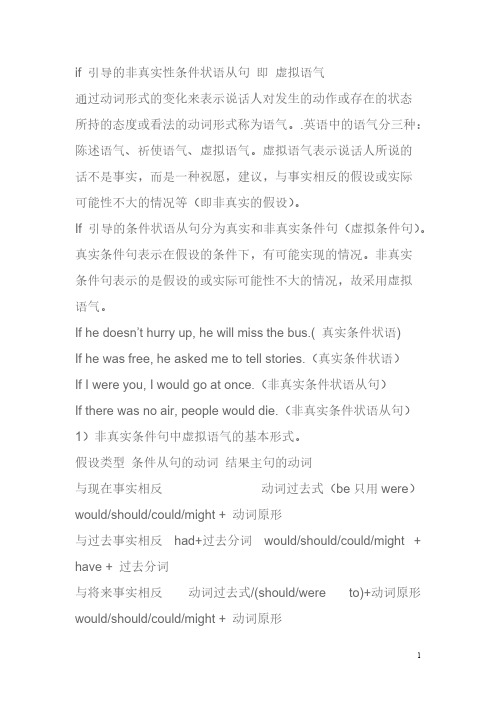
if 引导的非真实性条件状语从句即虚拟语气通过动词形式的变化来表示说话人对发生的动作或存在的状态所持的态度或看法的动词形式称为语气。
.英语中的语气分三种:陈述语气、祈使语气、虚拟语气。
虚拟语气表示说话人所说的话不是事实,而是一种祝愿,建议,与事实相反的假设或实际可能性不大的情况等(即非真实的假设)。
If 引导的条件状语从句分为真实和非真实条件句(虚拟条件句)。
真实条件句表示在假设的条件下,有可能实现的情况。
非真实条件句表示的是假设的或实际可能性不大的情况,故采用虚拟语气。
If he doesn’t hurry up, he will miss the bus.( 真实条件状语)If he was free, he asked me to tell stories.(真实条件状语)If I were you, I would go at once.(非真实条件状语从句)If there was no air, people would die.(非真实条件状语从句)1)非真实条件句中虚拟语气的基本形式。
假设类型条件从句的动词结果主句的动词与现在事实相反动词过去式(be只用were)would/should/could/might + 动词原形与过去事实相反had+过去分词would/should/could/might + have + 过去分词与将来事实相反动词过去式/(should/were to)+动词原形would/should/could/might + 动词原形①与现在事实相反If I had time, I would go for a walk.如果我有时间,我就会去散步。
(实际情况:我现在没有时间,也不会去散步。
)If I were you, I would take an umbrella.假如我是你的话,我会带上雨伞。
(事实上我不可能是你。
)I would say no if someone asked me to be in a movie.假如有人请我当电影演员,我会表示拒绝。
初中英语If引导的条件状语从句
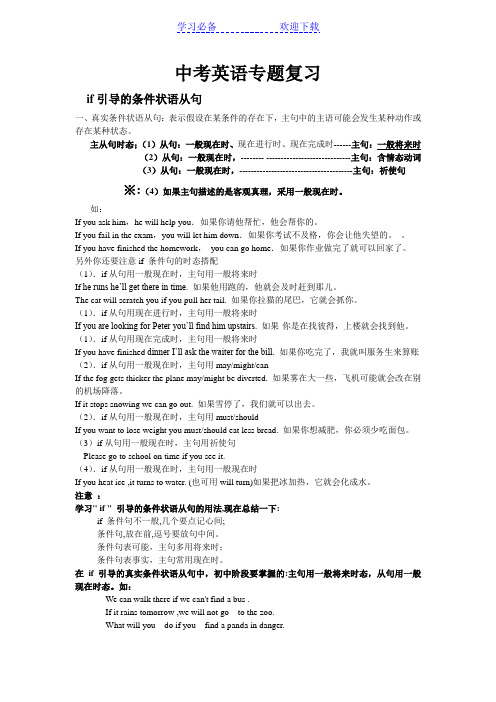
中考英语专题复习if引导的条件状语从句一、真实条件状语从句:表示假设在某条件的存在下,主句中的主语可能会发生某种动作或存在某种状态。
主从句时态;(1)从句:一般现在时、现在进行时、现在完成时------主句:一般将来时(2)从句:一般现在时,-------- -----------------------------主句:含情态动词(3)从句:一般现在时,---------------------------------------主句:祈使句※:(4)如果主句描述的是客观真理,采用一般现在时。
如:If you ask him,he will help you.如果你请他帮忙,他会帮你的。
If you fail in the exam,you will let him down.如果你考试不及格,你会让他失望的。
If you have finished the homework,you can go home.如果你作业做完了就可以回家了。
另外你还要注意if 条件句的时态搭配(1).if从句用一般现在时,主句用一般将来时If he runs he’ll get there in time. 如果他用跑的,他就会及时赶到那儿。
The cat will scratch you if you pull her tail. 如果你拉猫的尾巴,它就会抓你。
(1).if从句用现在进行时,主句用一般将来时If you are looking for Peter you’ll find him upstairs. 如果-你是在找彼得,上楼就会找到他。
(1).if从句用现在完成时,主句用一般将来时If you have finished dinner I’ll ask the waiter for the bill. 如果你吃完了,我就叫服务生来算账(2).if从句用一般现在时,主句用may/might/canIf the fog gets thicker the plane may/might be diverted. 如果雾在大一些,飞机可能就会改在别的机场降落。
- 1、下载文档前请自行甄别文档内容的完整性,平台不提供额外的编辑、内容补充、找答案等附加服务。
- 2、"仅部分预览"的文档,不可在线预览部分如存在完整性等问题,可反馈申请退款(可完整预览的文档不适用该条件!)。
- 3、如文档侵犯您的权益,请联系客服反馈,我们会尽快为您处理(人工客服工作时间:9:00-18:30)。
Summary
归纳总结
.
归纳总结 if 引导非真实条件从句中的用法 非真实条 If 从句谓语形式 主句的谓语形式 件句
现在 过去Leabharlann 过去式 (Present) (did/were) 过去完成式 (had done) 过去式/
would/could/should/ might +V. (原) would/could/should/ might +have done
would/could/might/should have done had done If…_________sth,… __________________ sth. (现在完成) (过去完成)
曾经有一份真挚的感情放在我的面前, 我没有珍惜。等我失去的时候我才后 悔莫及。 valued If I had ________(value) the true love have regretted when I got it, I wouldn’t _____________
_( not regret) when I lost it.
III. Imaginary future situation对将来的假想 If I had time next week, I would help you. If I should have time next week, I could help you. If I were to have time next week, I should\might help you.
非真实条件句表示说话人所说的话不是事实, 而是一种假设、愿望或推测。一般用于表示 现在事实相反的假设,过去事实相反的假设 以及对将来的假想。
合作探究 I. Unreal present condition与现在事实相反 If I worked hard, I might have money. If I had a lot of money, I could buy a ticket. If I bought a ticket, I would be on board. If I were on board, I should sail for America.
II. Imaginary past action与过去事实相反 If you had attended the meeting yesterday, you would\should have met her. If the doctor had come last night, the boy could\might have been saved.
would/could/ might/should do If…_________sth,… __________________ sth. were/did (动词原形) (过去式)
如果上天能够给我一个再来一次的机会, 我会对那个女孩子说三个字:“我爱你”。 offered If God ______(offer) me another chance right now, I would utter _______(utter )the three words to the girl ,“I love you”.
牛津高中英语模块六第三单元
if引导的非真实条件句
主讲人:南县一中 汤琼婧
如果你跳,我也和你一起跳进海中。
If you jumped , I would also jump into the sea.
自主学习
Unreal conditionals state a condition or
situation that is not real or is imaginary. We can use unreal conditionals to refer to an unreal present condition, an imaginary past action, an imaginary future situation.
did would/could/ were to do might/should do(原形) If…_________sth,… __________________ sth. should do
如果有一天我有足够的钱,我就会买下一座岛。 had were to have If Ishould _______ have (have) enough money would\could\ some day, I____________ (buy) an might\should buy island.
(Past)
未来
(Future)
would/could/should/ should/were to might +V. (原) +V原
That’s all!
